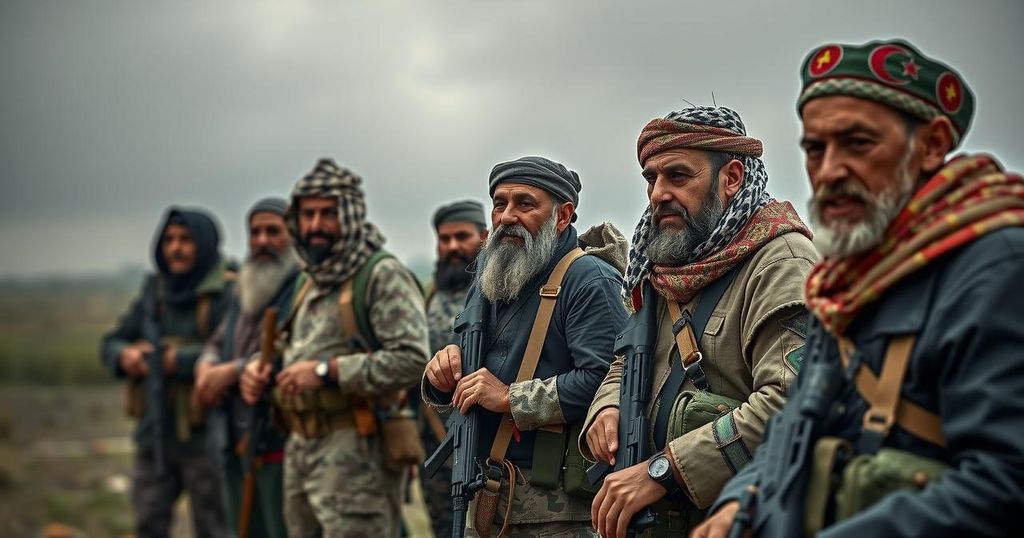Global news
AL, AL - SHALASH, AMERICA, ASIA, AUTONOMOUS ADMINISTRATION, BROTHERHOOD, BUBNA, CEASEFIRE, CIVILIAN CASUALTIES, CONFLICT, DEMOCRATIC AUTONOMOUS ADMINISTRATION, EAST SYRIA, EUROPE/ASIA, HUSSEIN AL - MASHI, INTERNAL SECURITY FORCES, JA, MANBI, MANBIJ, MANBIJ CANTON, MILITARY OPERATIONS, NORTH, RUSSIA, SHEIKH HUSSEIN AL - MASHI, SHEIKH MOHAMMED AL - JASSEM, SYRIA, SYRIAN DEMOCRATIC FORCES, TERRORISM, TURKEY
Isaac Bennett
0 Comments
Manbij Tribes Stand Firm Against Turkish Occupation in Syria
Tribal leaders in Manbij have declared their opposition to Turkish military actions in Syria. They emphasize their loyalty to the Democratic Autonomous Administration and the Syrian Democratic Forces, vowing to defend their lands against occupation. Recent escalations since October 23 have heightened tensions, prompting leaders to speak out against Turkey’s intentions and affirm their commitment to protecting regional autonomy.
In response to recent escalations in conflict, the Sheikhs and leaders of the tribes within the Manbij region reaffirmed their unwavering resolve against any potential Turkish occupation of lands in Syria. They expressed their full commitment to the Democratic Autonomous Administration and the Syrian Democratic Forces, stating unequivocally, “We will not allow Turkey to occupy new territories in Syria.” This declaration comes amid intensified Turkish military offensives against the regions of North and East Syria, which commenced on October 23, prompting defensive actions from the Syrian Democratic Forces. These tribal leaders highlighted the importance of territorial integrity and the necessity of defending their communities from foreign aggression. Sheikh Fahd al-Shalash from the Bani Said tribe articulated the collective perspective of the tribes, stressing that Turkish incursions target the foundations of their autonomous governance and societal harmony. He remarked, “The Turkish attacks target the project of Democratic Autonomous Administration, and their goal is clear to everyone. Since the beginning of the crisis in Syria, they have been trying to expand within Syrian territory.” Further addressing the implications of Turkish operations, Sheikh al-Shalash asserted that assaults on vital infrastructure serve to undermine regional stability and sow discord between the local populace and their governing structures. He also called attention to the perceived passivity of international guarantors, namely the United States and Russia, in addressing these aggressions, contending that this silence contributes to civilian suffering. Sheikhs Hussein al-Mashi and Mohammed al-Jassem subsequently echoed these sentiments, condemning the persistent Turkish assaults and vowing to protect the territorial sovereignty and governance of their people. Sheikh al-Jassem stated firmly, “The Turkish attacks will not break our resolve. We are the sons of the tribes and components of North and East Syria. Our stance is clear, and we will not allow Turkey to occupy new lands in Syria.” As these tribes affirm their commitment to regional autonomy and cooperation with the Syrian Democratic Forces and the Manbij Military Council, they maintain a united front against foreign incursions, emphasizing communal resilience and ethical duty toward their homeland.
The ongoing conflict in Syria has seen various regional powers vie for influence, leading to complex dynamics on the ground. The Manbij region, significant due to its strategic location, has become a focal point for tensions stemming from Turkish interests in expanding their territorial control within Syria. The Democratic Autonomous Administration has emerged as an alternative governance model, advocating for local autonomy and democratic representation, which contrasts starkly with external military encroachments. This backdrop provides context for the strong statements made by tribal leaders opposing Turkish actions and underscoring their commitment to self-governance and territorial defense.
In summary, the tribes of Manbij unequivocally oppose any Turkish encroachments on Syrian soil, pledging their support for the Democratic Autonomous Administration and the Syrian Democratic Forces. Leaders from various tribes articulated their determination to protect their territories against external military aggression, reflecting a broader commitment to regional stability and self-determination. Their solidarity against Turkish operations highlights the critical intersection of territorial integrity and local governance in the ongoing conflict in Syria.
Original Source: hawarnews.com




Post Comment